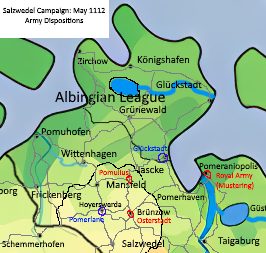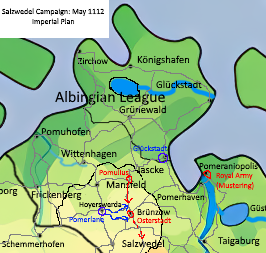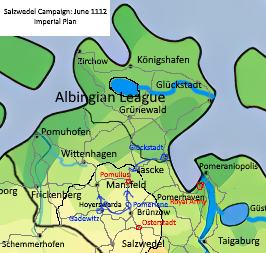Chapter XL: The Salzwedel Campaign, May 1112
May 1112, Principality of Salzwedel, Kingdom of Pomerania
Imperial Plans and dispositions at the start of May
Pomerlane's Campaign into Pomerania thus far had been relatively uneventful, for his two main armies at least. Plauen was a reversal for his cause, no doubt, but the capture of key fortresses in the Principality without a fight made up for it somewhat. Pomerlane arrived with his army at the crossroads town of Hoyerswerda on May 2nd, where he met with Quedlinburg's army that had come from the South. The two armies rested for two days together as the two men thought of what they would have to do next in the aftermath of Plauen.

Dispositions of all forces at start of May, 1112.
Beyond the hilarity of the King's Letter, both men and the other generals came to the realization that Pomulius had to be cornered and defeated by the end of June, or the Royal Army would force them to abandon all of their gains. As of now, they understood that Osterstadt's Army of ~50,000 at Brünzow was not ready to fight against both of their combined armies of ~65,000. Quedlinburg suspected that Osterstadt would withdraw to the south if threaten to be cut off from the north and the south by their armies, something that Pomerlane agreed with under the presumption that the army that took the northern road would march faster than its southern ally.
Cavalry would have to be used to rapidly prevent Osterstadt from taking the northern route towards Pomulius, or at least delay him long enough that the rapidly marching Black Army, which would take the northern road would be able to catch them before Pomulius could. Furthermore, Pomerlane would dispatch Theophlylact, who had recently recovered from a sickness that had him bedridden since March, to slow down Pomulius as much as possible. The goal was not to force Osterstadt into a battle, but rather force him away from Pomulius using similar methods that were used against Mansfeld. It was suspected that Pomulius's army experienced men was likely too exhausted from its forced march and hard fight at Plauen to be able to match the pace of the Black Army, which was filled with veterans used to rapid marches. Osterstadt also wouldn't have the same luxury given his army was even more green and that a rapid march would likely result in its own exhaustion and depletion.
The effects of losing a well-trained and veteran army at Woltersdorf and even the defeat the previous year at Schwarzbach was really starting to show on a grand operation scale. Pomerlane famously after looking at the map, stuck his knife on the crossroads hamlet of Altenkirchen north of Brünzow and stated:
This is our Schwerpunkt, gentlemen. This tiny crossroads hamlet is where this campaign will be won or lost at. We take it ten days from tomorrow, or our lives become much harder going forward. We must strike while the iron is hot and take advantage of our enemies' current weakness or we will find ourselves the ones hammered.
The final plan would call for the cavalry division of Theophylact to ride north with all haste to delay and harass the army of Pomulius, something that the young Chalkydrian had plenty of experience in while Lichtenstein's Cavalry Division would make haste towards Altenkirchen, doing all in their power to hold the town should Osterstadt move north. In the meantime, the Black Army would force march itself towards Altenkirchen along the Hoyerswerda-Altenkirchen Road while Quedlingburg would march at normal pace along the Hoyerswerda-Brünzow to the south. By May 14th, Altenkirchen must be captured by the Black Army and Osterstadt must either be forced into battle there or in retreat to the South or the East.
Should Pomulius reach Altenkirchen after May 14th and Osterstadt remains firm, Quedlinburg was to attack Osterstadt from the South while Pomerlane launched probing assault from the North. It was expected that Osterstadt would be forced to retreat or destroyed in that battle, allowing both armies to turn against the tired army of Pomulius. Either way, the campaign would be a failure should Altenkirchen not be held by Liechtenstein until the Black Army arrived.

Imperial Plan for the Altenkirchen Campaign
The Altenkirchen Campaign
As both armies set out on May 5th, a sense of optimism and impeding victory filled the spirits of the men. The Black Army had this aura of joy and confidence at the upcoming events that came from its trust in Pomerlane and their own abilities. They had yet to lose a battle yet under him, and its veterans were used to the hard marches and little rest that came with campaigning under him. There wasn't an army in the world that could match the speed of the Black Army and they wanted to prove their greatness to the world once again. The men sang songs as they marched and were eager for yet another great victory.
By May 8th, Liechtenstein had taken Altenkirchen by total surprise, forcing its garrison of 150 to surrender without a shot being fired. It was a brilliant coup performed by the clever Prince, and he immediately ordered his men to prepare barricades and dig in for a coming assault. Prince Friedrich Wilhelm Pomu von Lichtenstein was one of the older officers in the Black Army at 62, and a personal friend of Quedlinburg. His reputation as a skilled and clever cavalry commander was backed up by 30 years of success in the Pomeranian Army and now under Pomerlane. He had been appointed to command the other cavalry division in the Black Army after its commander had died of consumption during the previous winter. Now, the "Kurzer Dragoner" had once again proven that he still had it after so many years and still had much to prove.
The taking of Altenkirchen was a surprise to Osterstadt, who had only been reported the previous day that the Imperial Armies were marching in his general direction. Osterstadt, however, was not worried by this cavalry strike. He himself was a veteran Cavalry officer in his own right and was actual a friend of both Lichtenstein and Quedlinburg. But going off the information presented to him that the Imperials were 20 days away, and not wanting to commit to a battle against Lichtenstein yet, he waited to see what Lichtenstein was up to rather than immediately attacking him. In retrospect, this seems like a foolish move, but it was the correct move given the fog of war.
It was not until the evening of May 9th that Osterstadt began to recieve worrying reports. Scouts reported that the Black Army was making rapid progress towards Altenkirchen and that given its progress, it could arrive as early as the 12th. Furthermore, it had become clear that Quedlinburg was marching to surround Osterstadt on both sides of the main road, something he could ill afford to happen. Osterstadt had also not heard from Pomulius since May 4th, and he rightfully assumed that Pomulius was too far away to make a rapid march towards him at this point. But the most worrying of all was actually the false reports of another army that had apparently taken the back roads from Hoyerswerda and was closing in on the main road between Plauen and Brünzow. Their strength was reported to be 15,000 and they were expected to arrive at the road the next day. Osterstadt was not the passive commander that Mansfeld was, but with the information he had, there was a strong possibility of him surrounded with his army of greenhorns by the Black Army should he march north.
Osterstadt, with this information, decided to act immediately. He knew that his cousin would be in trouble if he did not dislodge Lichtenstein immediately from Altenkirchen and force march north that night, so he in the evening hours of May 9th, he attempted to drive Lichtenstein from Altenkirchen. The well dug in and entrenched Dragoons and horse artillery of Lichtenstein put up a ferocious fight for the hamlet. The inexperience of the Pomeranians was showing greatly, as the attacks were uncoordinated and piecemeal. 10 assaults were launched and 10 were repulsed at great cost. During the 8th Assault, the Pomeranians nearly broke through before Lichtenstein rallied his Lancers and charged the Pomeranians, forcing them to retreat and nearly breaking them completely before cannon fire forced the Lancers back. By the time night came, the Hamlet was ablazed and both sides were exhausted. 1,250 Pomeranians were lost to 1,800 Imperials but Lichtenstein managed to hold off a force nearly 6 times his size with his cavalry division. Osterstadt was furious with his officers for their pathetic showing but understood that this stalemate was ultimately caused by his army's lack of drill and experience. Believing that he could no longer hope to reach Pomulius, he pulled back to Brünzow to weigh his options

Lichtenstein's charge at Altenkirchen
Meanwhile, Pomulius had been left in the dark about everything taking place up to this point until May 10th. He had been harrassed by Imperial Cavalry for the last two days but thought nothing of it until the news from the south arrived. Immediately, he picked up his pace, knowing exactly what was going on now and started to force march his men towards the South. But when word reached him on the 12th that Osterstadt had withdrawn his army to the South, he ordered his army to halt for the time being. Pomulius was now in a difficult position. His army was exhausted from the hard marching and fighting it had done over the past two months and without the ability to link with Osterstadt he had few options left. He would give his men a day of rest on the 13th before turning back north to find a place to rest his army and prepare for his next move.
With the news that Osterstadt had retreated to the South reaching both Pomerlane and Quedlinburg on the 11th, it was decided by both of them that they would slow their own marches down for the time being and join up at Brünzow. Lichtenstein was ordered to join with Theophylact the same day as well, but both would be called back after Pomulius started his march North on the 14th. By May 18th, Pomerlane reached Brünzow and was joined the next day by Quedlinburg.
Aftermath of the Altenkirchen Campaign.
The campaign had been a resounding success, owed to the long-term effects of Pomeranian losses, and the hard fighting done by Lichtenstein. Arguably, however, it was the awful scouting report that Osterstadt operated under that sealed the deal for the Imperial success. The Pomeranian Army had long suffered from poor scouting and its effects had led to the disaster at Woltersdorf and now the potential disaster for Pomulius. Pomerlane understood that this strategic and operational victory had to be exploited immediately and devised another plan that would hopefully lead to the cornering and defeat of Pomulius in June. He would march his army back to Hoyerswerda and then north towards Mansfeld, while Quedlinburg would proceed north himself. He sent a letter to Glückstadt ordering him to immediately march towards Plauen and called on his reserves he left at Hoyerswerda, which consisted of the Black Army's First Division under August-Pomeranius von Gadewitz and 15,000 recently joined volunteers from Pomerania under Pomupius von Falkenberg to march north towards Mansfeld at all haste. The further Pomulius could be driven from the Royal Army, the greater chance of his destruction. Resting his men for 3 days, Pomerlane put his plan into action on May 22nd.

Imperial Plan for the June Campaign
Pomulius on the other hand come to the grim conclusion that he would not be able to escape the trap that the Imperials were setting up. He knew of the 23,000 men that were gathered at Hoyerswerda and that Pomerlane would surely aim to push him back towards Mansfeld. But Pomulius was about to throw a wrench into the entire June plan himself by doing the unexpected. Instead of simply falling deeper into the trap laid before him, he decided that after his men had gained some proper rest, he was going to march south towards Brünzow and attack whatever was there head on. After rest, he set out on May 29th. At the village of Krummenhennersdorf on June 6th, his army would meet its foe, the Archducal Army under Quedlinburg and the next day, a great battle would erupt that would decide the fate of the entire campaign.